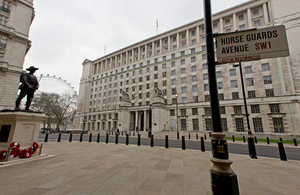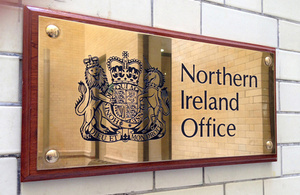It’s a privilege to be here, at this crucial RAF base from where aircraft and crews are poised 24/7, 365 days a year, to scramble and intercept potential threats to UK airspace.
And from where the United Kingdom contributes to NATO Air Policing missions, having deployed to Iceland, Estonia, Romania and Lithuania in recent times. A strength and a tradition that all of us in Scotland should be rightly proud of. I thank you all for all you do.
The last eight days have been the biggest in generations for the defence sector with the publication of the Integrated Review.
And that was followed swiftly by yesterday’s launch of the Defence Command Paper.
This paper outlined clear and credible plans as to how we will modernise and adapt our Armed Forces, supported by additional UK Government investment of £24billion over the next four years.
And then today will see the release of the new Defence and Security Industrial Strategy, which details the framework through which we will deliver on these plans working with industry, academia and our global partners.
This will see Scotland benefit from increased investment, bringing skilled jobs in traditional areas such as shipbuilding, and also in rapidly developing areas such as cyber and space.
UK defence, and Scotland, enjoy a special two-way relationship. The UK brings key security and economic benefits to Scotland while Scottish military and civilian personnel at establishments across the nation provide capabilities that are vital to the UK and our NATO allies.
Defence makes a significant economic contribution to Scotland with 15,000 regular and reserve armed forces personnel, supported by 4,000 MOD civilians.
And defence procurement contracts support over 12,000 private sector jobs in Scotland.
Bases such as this – home to brave service personnel and civilians, and state of the art kit such as Typhoon jets and submarine hunting aircraft – show that Scotland has a crucial role to play in the security of the UK and the world.
The significance of RAF Lossiemouth is clear, as it continues to expand and modernise as home to four front line Typhoon squadrons, Poseidon P-8 Maritime Patrol Aircraft, and the RAF’s new Wedgetail E-7 early warning aircraft.
The new MPA Strategic Facility is part of a £470million UK Government investment in infrastructure at this base.
So, let me talk a little more about the Integrated Review and why it is so important.
It differs from previous reviews in that it addresses our national security and international policy together.
It more strongly addresses the link between our domestic and international policy.
And it takes a thematic approach that brings together all the instruments of government behind overarching objectives.
The first responsibility of any government must be to protect its citizens.
And, in a changing world, together the United Kingdom must stay ahead of the evolving threats to our people, interests, and allies.
Alone, no one part of our Union can adequately protect its citizens from the new threats we face.
Nor can we prosper economically and socially in the way we can as a United Kingdom.
Together, all parts of the UK will take full advantage of the opportunities that lie before us.
The Integrated Review sets this out in four strategic areas.
Firstly, Sustaining strategic advantage through science and technology.
In short, this means that we will fortify and extend the position of the UK – and Scotland in particular – as a global science and technology superpower.
We will build our cyber strengths and capabilities in the frontiers of cyberspace, emerging technology, data, and space.
Crucially, the Integrated Review sets the ambition for the UK to be a meaningful player in space – using a mixture of sovereign capabilities and partnerships with our allies.
To achieve this we are developing the first national space strategy.
The UK space industry already generates an income of £14.8billion annually, with more satellites produced in Scotland than any country in Western Europe.
Scotland will remain at the heart of this national effort.
We will launch British satellites from Scotland by 2022 as part of the UK Space Agency’s programme to enable a UK-wide market for spaceflight services.
Secondly, Shaping the open international order of the future.
International competition and the effects of the global pandemic will make it ever more important for the UK to work to restore a spirit of greater international cooperation.
Our influence on the world stage is extensive through our role in the UN and the global trading system.
There are real benefits that our extensive diplomatic network brings us in nearly 270 places around the world.
Our ambition to play an increasingly active part on the world stage will be of huge benefit to Scotland.
For example, just recently it was announced that the UK Government’s Foreign, Commonwealth & Development Office’s site in East Kilbride will increase in size by a further 500 jobs taking the total number to 1,500 by 2025.
Thirdly, Strengthening security and defence at home and overseas.
The threats we face are changing rapidly and we need to adapt and excel in new areas of defence to ensure the nations of the UK are safe and can prosper.
Our selfless servicemen and women are, of course, hugely important and will remain so.
As well as a quick reaction airbase, Scotland’s proximity to the North Atlantic means we are also home to a strong naval presence.
Her Majesty’s Naval Base on the Clyde plays a vital role in defending us and our NATO allies.
It is home to the Royal Navy nuclear submarines and continues to receive £1.5billion worth of infrastructure investment.
As the second largest single-site employer in Scotland it currently provides 6,800 jobs and will grow to 8,200 jobs in future.
The importance of this site cannot be over-estimated and the Integrated Review highlights the new risks posed by the nuclear ambitions of some states.
In a context in which nuclear-armed states are prepared to flout international norms of behaviour, we must protect ourselves, and our allies, by the continued operation of a minimum, credible, independent nuclear deterrent based on continuous at sea presence.
But a country’s security can no longer be measured by the number of troops or weapons they have.
The threats of the 21st Century are different.
We need to be prepared for high-tech warfighting and to defend ourselves from cyber-attacks and disinformation.
We will play our part in this within a strong NATO.
Fourthly, Building resilience at home and overseas.
We will improve our own ability, and those of our allies, to anticipate, prevent, prepare for, respond to, and recover from risks.
The pandemic has shown us how vital this endeavour is and just how connected global threats can be.
Our fantastic scientists have made a global impact. We will accelerate vaccine distribution globally as the fastest route to recovery from the Covid crisis, and strengthen UK and global preparedness for future pandemics.
The British military’s work to support Covid testing and vaccinations in Scotland is testament to this and the power of the Union to keep people safe.
The Integrated Review also makes tackling climate change and biodiversity loss the UK’s foremost international priority.
Through the COP26 Climate Change Conference in Glasgow this November, and beyond, our leadership will be vital.
To conclude Ladies and Gentlemen, In the Integrated Review the Prime Minister states:
Our Union will be more secure and prosperous, with wealth and opportunity shared more equitably across its regions bound by shared values and interests, we will stand stronger together on the international stage.
And I could not agree more.
Together, the Integrated Review, the defence Command Paper and the Defence and Security Industrial Strategy demonstrate powerfully how important defence is to Scotland – and how important Scotland is to the defence of the UK and, indeed, our NATO allies.
We cannot take our security for granted, but by working together in a strong Union, we can ensure a safe, prosperous future for the UK.

